
Dante Alighieri, most likely baptized Durante di Alighiero degli Alighieri and often referred to as Dante, was an Italian poet, writer and philosopher. His Divine Comedy, originally called Comedìa and later christened Divina by Giovanni Boccaccio, is widely considered one of the most important poems of the Middle Ages and the greatest literary work in the Italian language.
Dan Simmons is an American science fiction and horror writer. He is the author of the Hyperion Cantos and the Ilium/Olympos cycles, among other works which span the science fiction, horror, and fantasy genres, sometimes within a single novel. Simmons's genre-intermingling Song of Kali (1985) won the World Fantasy Award. He also writes mysteries and thrillers, some of which feature the continuing character Joe Kurtz.

Giosuè Alessandro Giuseppe Carducci was an Italian poet, writer, literary critic and teacher. He was very noticeably influential, and was regarded as the official national poet of modern Italy. In 1906, he became the first Italian to receive the Nobel Prize in Literature. The Swedish Academy's motivation was that "not only in consideration of his deep learning and critical research, but above all as a tribute to the creative energy, freshness of style, and lyrical force which characterize his poetic masterpieces."

In Greek mythology, Sinon or Sinopos was a fictional character who was a Greek warrior during the Trojan War.

Pistoia is a city and comune in the Italian region of Tuscany, the capital of a province of the same name, located about 30 kilometres (19 mi) west and north of Florence and is crossed by the Ombrone Pistoiese, a tributary of the River Arno. It is a typical Italian medieval city, and it attracts many tourists, especially in the summer. The city is famous throughout Europe for its plant nurseries.
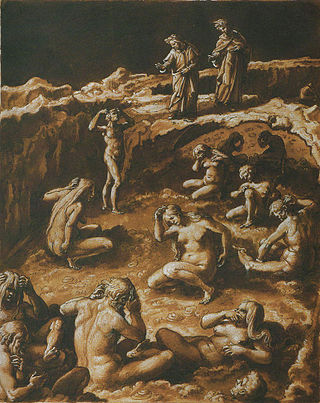
In Dante Alighieri's Inferno, part of the Divine Comedy, Malebolge is the eighth circle of Hell. Roughly translated from Italian, Malebolge means "evil ditches". Malebolge is a large, funnel-shaped cavern, itself divided into ten concentric circular trenches or ditches. Each trench is called a bolgia. Long causeway bridges run from the outer circumference of Malebolge to its center, pictured as spokes on a wheel. At the center of Malebolge is the ninth and final circle of hell.

Guido Cavalcanti was an Italian poet. He was also a friend and intellectual influence on Dante Alighieri.

Ugolino della Gherardesca, Count of Donoratico, was an Italian nobleman, politician and naval commander. He was frequently accused of treason and features prominently in Dante's Divine Comedy.

Italian literature is written in the Italian language, particularly within Italy. It may also refer to literature written by Italians or in other languages spoken in Italy, often languages that are closely related to modern Italian, including regional varieties and vernacular dialects. Italian literature begins in the 12th century, when in different regions of the peninsula the Italian vernacular started to be used in a literary manner. The Ritmo laurenziano is the first extant document of Italian literature.
Vanna is a given name that first appeared in recorded European history circa 1294. The Italian medieval feminine name originated in Tuscany, and is particular to Florence, Italy.

Prayers to Broken Stones is a short story collection by American author Dan Simmons. It includes 13 of his earlier works, along with an introduction by Harlan Ellison in which the latter relates how he "discovered" Dan Simmons at the Colorado Mountain College's "Writers' Conference in the Rockies" in 1981. The title is a borrowed line from T. S. Eliot's "The Hollow Men".

Ugolino Visconti, better known as Nino, was the Giudice of Gallura from 1275 or 1276 to his death. He was a son of Giovanni Visconti and grandson of Ugolino della Gherardesca. He was the first husband of Beatrice d'Este, daughter of Obizzo II d'Este. His symbol was a cock.
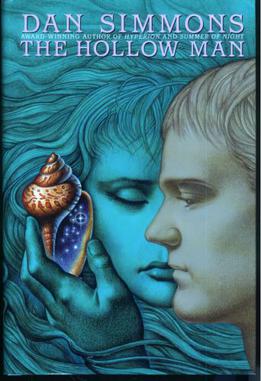
The Hollow Man is a novel by American author Dan Simmons. The book was initially published by Bantam Books on September 1, 1992. It narrates the story of a university lecturer who has the ability to "hear" the thoughts of others, an ability he shares with his dying wife.
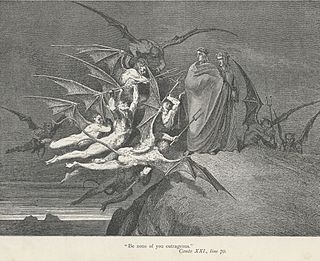
Malacoda is a character in Dante Alighieri's Inferno, where he features as the leader of the Malebranche, the twelve demons who guard Bolgia Five of Malebolge, the eighth circle of Hell. The name Malacoda is roughly equivalent to "bad tail" or "evil tail" in Italian. Unlike other characters such as Geryon, which are based on mythical characters, Malacoda was invented by Dante and is not a mythological reference.
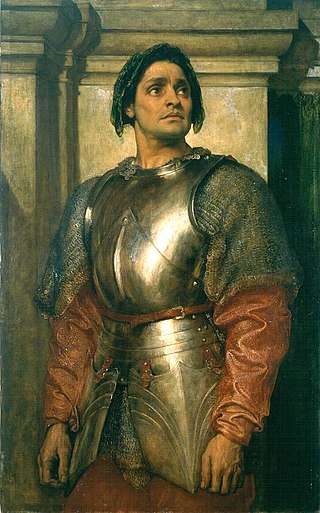
Cante dei Gabrielli di Gubbio was an Italian nobleman and condottiero.

Inferno is the first part of Italian writer Dante Alighieri's 14th-century epic poem Divine Comedy. It is followed by Purgatorio and Paradiso. The Inferno describes Dante's journey through Hell, guided by the ancient Roman poet Virgil. In the poem, Hell is depicted as nine concentric circles of torment located within the Earth; it is the "realm ... of those who have rejected spiritual values by yielding to bestial appetites or violence, or by perverting their human intellect to fraud or malice against their fellowmen". As an allegory, the Divine Comedy represents the journey of the soul toward God, with the Inferno describing the recognition and rejection of sin.
Jacopo Alighieri was an Italian poet, the son of Dante Alighieri, whom he followed in his exile. Jacopo's most famous work is his sixty-chapter Dottrinale. He is represented by his father in the Paradiso of the Divine Comedy as Saint James along with Saint Peter and Saint John the Evangelist, representing his brothers Pietro and Giovanni.

Casella was an Italian composer and singer, none of whose works have survived.
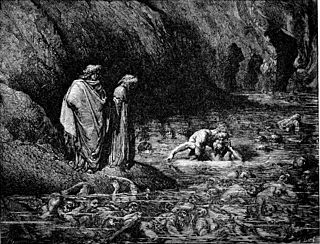
Ruggieri degli Ubaldini was an Italian archbishop.
















